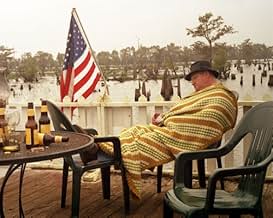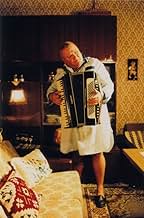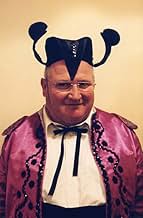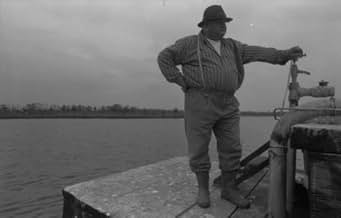IMDb-BEWERTUNG
7,0/10
3796
IHRE BEWERTUNG
Als Schultze im Radio Zydeco-Musik entdeckt, wandelt sich sein monotoner Alltag. Schultze erlernt eine neue Akkordeon-Spielweise und diese neu entdeckte Faszination führt ihn auf eine Reise ... Alles lesenAls Schultze im Radio Zydeco-Musik entdeckt, wandelt sich sein monotoner Alltag. Schultze erlernt eine neue Akkordeon-Spielweise und diese neu entdeckte Faszination führt ihn auf eine Reise zum Louisiana Delta.Als Schultze im Radio Zydeco-Musik entdeckt, wandelt sich sein monotoner Alltag. Schultze erlernt eine neue Akkordeon-Spielweise und diese neu entdeckte Faszination führt ihn auf eine Reise zum Louisiana Delta.
- Auszeichnungen
- 11 Gewinne & 6 Nominierungen insgesamt
Empfohlene Bewertungen
First things first: You will need a lot of patience while watching "Schultze gets the blues". There are no dramatic scenes, no sensational turns or something that blows you out of your seat. Instead, the film develops slowly, working merely with pictures than with dialogues. And this is what it's all about: the boredom of retirement, the concealed longing for something new and the desperate hope of getting the "blues". Schultze, the main actor,tries to seek it by playing a tune he heard on the radio on his accordion, which leads him from Sachsen-Anhalt (in the former East Germany, DDR) to a music festival in Texas. This film is definitely worth watching, although it won't satisfy your desire for action or a surprising plot.
This movie takes its time to develop. In more than one respect it reminded me of a Kaurismäki film. The landscape is depressing, the colors are not very bright, the shots are long and there is not much dialogue. And people seem only to come alive (whether it's in Germany or the US) when they're making music. There are moments of comedy but not many. Instead, you get to watch "everyday life" for a long time before something happens. And when it happens, it's not a dramatic turn or twist . . . It does not incite the characters to change completely . . . There is just a small change.
When you put all of this together, you get a very touching tale of humanity. A tale of friendship and loneliness. I think the characters are portrayed in a very life-like fashion (for example, when the loner Schultze travels to the US he is no more capable of socially connecting with people than he was in his hometown). You have to be patient with the story because there is no classic structure (exposition, story development, climax) . . . but I got really attached to the characters. There is a lot of loneliness in this film. But this is what makes it so attractive.
When you put all of this together, you get a very touching tale of humanity. A tale of friendship and loneliness. I think the characters are portrayed in a very life-like fashion (for example, when the loner Schultze travels to the US he is no more capable of socially connecting with people than he was in his hometown). You have to be patient with the story because there is no classic structure (exposition, story development, climax) . . . but I got really attached to the characters. There is a lot of loneliness in this film. But this is what makes it so attractive.
10Timmie42
A beautiful spark of a movie that had me quietly laughing throughout. Definitely worth the watch if you're in the mood for a slow, sublime, and funny film that rewards you tenfold.
Schultze is a quiet man, recently retired, who suddenly discovers the beauty of zydeco music. It has the feeling invoked by films such as "Paris, Texas", "Broken Flowers", with it's characters that pass in and out of the protagonist's life, living in their own world, yet wanting to be part of something bigger. Schultze takes that leap of faith in the simple way of pursuing the music that has finally touched his soul.
Some people might find it much too slow. The camera lingers on many long shots of subtle hilarity, emphasizing the humor in the sometimes mundane existence people experience.
One of the better films I've seen in a while.
Schultze is a quiet man, recently retired, who suddenly discovers the beauty of zydeco music. It has the feeling invoked by films such as "Paris, Texas", "Broken Flowers", with it's characters that pass in and out of the protagonist's life, living in their own world, yet wanting to be part of something bigger. Schultze takes that leap of faith in the simple way of pursuing the music that has finally touched his soul.
Some people might find it much too slow. The camera lingers on many long shots of subtle hilarity, emphasizing the humor in the sometimes mundane existence people experience.
One of the better films I've seen in a while.
I loved this movie. First of all there's the surface. Schultze is just so goddammed lovable. He pulls you in. Then there are the layers. And there are so many.
The juxtapositions. Schultze riding his bicycle on one side of the screen and the dirt bikers buzzing over the top of slag heaps on the other. His small garden house, a little Eden, overshadowed, of course, by a very large and nearly ancient slag heap.
Then the odd wanderlust. The woman at his mother's nursing home who insists she's French despite the fact that she's in a nursing home in East Germany. Followed by his sojourn to Louisiana, which insists on being French despite the fact that it's in America. Did he go there looking for her?
Then the premonitions. Early on a brief sound bite on the radio about lung cancer. Then near the end, he's offered a meal of crabs in the bayou. "Ja, Krebs," he says. Krebs means cancer in German. And he was a miner, so worked every day breathing radon. Did he have cancer?
And of course the music. An accordionist who plays the local polka, he picks up zydeco by ear and loves it. But his fellow Germans don't like it, and they're even less interested in the US. In fact he stops playing after he gets to America. They want polka even more than the Germans do, albeit a strange American kind that includes yodeling.
Then the unspoken. So much of this story is told by pictures, not dialog. It's a subtlety that Hollywood has completely lost touch with. It's so refreshing to see it again.
This movie is a delight. I defy anyone to dislike it. There's something of An Occurrence at Owl Creek Bridge in it, but it's not quite that facile.
It's a quiet tour de force. I want more.
The juxtapositions. Schultze riding his bicycle on one side of the screen and the dirt bikers buzzing over the top of slag heaps on the other. His small garden house, a little Eden, overshadowed, of course, by a very large and nearly ancient slag heap.
Then the odd wanderlust. The woman at his mother's nursing home who insists she's French despite the fact that she's in a nursing home in East Germany. Followed by his sojourn to Louisiana, which insists on being French despite the fact that it's in America. Did he go there looking for her?
Then the premonitions. Early on a brief sound bite on the radio about lung cancer. Then near the end, he's offered a meal of crabs in the bayou. "Ja, Krebs," he says. Krebs means cancer in German. And he was a miner, so worked every day breathing radon. Did he have cancer?
And of course the music. An accordionist who plays the local polka, he picks up zydeco by ear and loves it. But his fellow Germans don't like it, and they're even less interested in the US. In fact he stops playing after he gets to America. They want polka even more than the Germans do, albeit a strange American kind that includes yodeling.
Then the unspoken. So much of this story is told by pictures, not dialog. It's a subtlety that Hollywood has completely lost touch with. It's so refreshing to see it again.
This movie is a delight. I defy anyone to dislike it. There's something of An Occurrence at Owl Creek Bridge in it, but it's not quite that facile.
It's a quiet tour de force. I want more.
This is a 2003 German film that recently found it's way to my local video store. It is a different film than I usually find, very plain on the surface, yet incredibly complex at the same time. It tells a simple story in a very understated way and the overall effect is quite powerful.
Schultze is a recently retired miner, a hard working man that now finds a lot of time on his hands and not much else. His mother is in a nursing home with dementia, his only family his mates from work who like to share a glass of beer when they get the chance. The imagery in this film is stark and dramatic. The long pauses tempt you to reach for the fast forward button, but they create the emptiness you will understand about Schultze's life. His only bright spot is his accordion, and his membership in the local music club which is celebrating their 50th anniversary. This year they offer a special prize, an expense paid trip to Texas. The club received an invitation from their "sister city" to send one person to their annual German-American festival. The winner will be selected at their Anniversary concert, "may we put you down for your usual polka Schultze?" As the story slowly unfolds, you may begin to see the threads that weave this beautiful tapestry. Or they may be so subtle that they go past you like a line on the sidewalk that you step over everyday. In the end, you will hopefully get the message about going out and finding happiness wherever you can.
Schultze is a recently retired miner, a hard working man that now finds a lot of time on his hands and not much else. His mother is in a nursing home with dementia, his only family his mates from work who like to share a glass of beer when they get the chance. The imagery in this film is stark and dramatic. The long pauses tempt you to reach for the fast forward button, but they create the emptiness you will understand about Schultze's life. His only bright spot is his accordion, and his membership in the local music club which is celebrating their 50th anniversary. This year they offer a special prize, an expense paid trip to Texas. The club received an invitation from their "sister city" to send one person to their annual German-American festival. The winner will be selected at their Anniversary concert, "may we put you down for your usual polka Schultze?" As the story slowly unfolds, you may begin to see the threads that weave this beautiful tapestry. Or they may be so subtle that they go past you like a line on the sidewalk that you step over everyday. In the end, you will hopefully get the message about going out and finding happiness wherever you can.
Wusstest du schon
- PatzerIn one of the dancing scenes, a crewmember runs across the screen as the camera follows the elderly dancing couples.
- Zitate
Captain Kirk: [while hooking up Schultze's boat] I'm captain Kirk.
- VerbindungenReferences Raumschiff Enterprise (1966)
- SoundtracksLong Temps Passe
Written by Bruce Barnes
Performed by Sunpie and the Louisiana Sunspots
from the album "The Language of New Orleans, Vol. 5: Zydeco"
Top-Auswahl
Melde dich zum Bewerten an und greife auf die Watchlist für personalisierte Empfehlungen zu.
- How long is Schultze Gets the Blues?Powered by Alexa
Details
- Erscheinungsdatum
- Herkunftsland
- Offizieller Standort
- Sprachen
- Auch bekannt als
- Шульце играет блюз
- Drehorte
- Produktionsfirmen
- Weitere beteiligte Unternehmen bei IMDbPro anzeigen
Box Office
- Bruttoertrag in den USA und Kanada
- 595.071 $
- Eröffnungswochenende in den USA und in Kanada
- 14.074 $
- 20. Feb. 2005
- Weltweiter Bruttoertrag
- 4.034.232 $
- Laufzeit
- 1 Std. 54 Min.(114 min)
- Sound-Mix
- Seitenverhältnis
- 1.85 : 1
Zu dieser Seite beitragen
Bearbeitung vorschlagen oder fehlenden Inhalt hinzufügen










